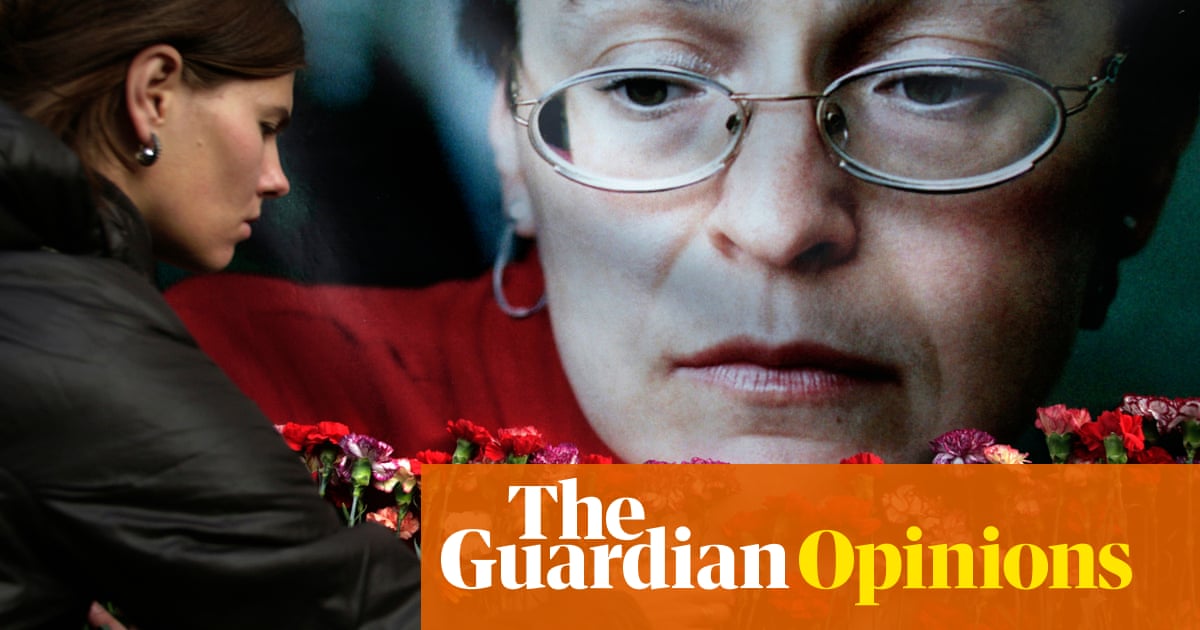What drives someone to become a journalist? Agoodjournalist, someone whose keyboard is a tool for exposing injustice, a truth-seeker who would risk life and limb to report their experiences back to the world? I know I couldn’t do it. I’ve interviewed people for a research project and was hopeless. I found myself shying away from asking the really difficult questions. There’s no way I could confront a corrupt official, or race to file a breaking story before a hostile regime tried to silence me, possibly for ever. I like to think of myself as the kind of person who would speak truth to power, but would I really, if my life was in the balance?
One of the many privileges of being an actor is that it affords you the opportunity to dip your toes into other worlds and experiences from the safest possible distance. In the upcoming film Words of War, I have the honour of portraying the Russian journalist and human rights activist Anna Politkovskaya – a woman with immense courage and integrity who, despite numerous threats to her life, continued to be a blazing beacon of truth in a time and place where speaking truth was extremely dangerous. The film,which was partly inspiredby Politkovskaya’sobituary in this newspaper, allowed me to delve into her remarkable life and work. The experience gave me a deeper appreciation for the journalists who risk everything to tell the stories that inform and shape our world.
Those who tell these stories face more threats than perhaps ever before. Journalism has become a dangerous profession; according to the Committee to Protect Journalists, more than 1,800 journalists and media workers have been killed while pursuing a story since 1992. Of these, at least 124were killed in 2024 alone, making last year the deadliest in three decades. Nearly 70% of these deaths were at the hands of the Israeli military in Gaza and Lebanon. There was also a sharp 56% increase in the number of press violationsagainst female journalistssince 2023, according to the Coalition for Women in Journalism, including detentions, harassment, physical assault, threats and intimidation. Threats aren’t reserved for war zones or authoritarian regimes. Journalists are also coming under attack in western democracies; on the US campaign trail, Donald Trumpspoke about revoking broadcast licencesand jailing journalists, while rich individuals in Britain havetargeted journalistswith insidious Slapps (strategic lawsuits against public participation).
In preparation for my role as Politkovskaya, I immersed myself as much as I could in the lives of the people who report from the frontlines of conflict, corruption and catastrophe, reading about and talking face-to-face with some of these extraordinary women and men. Before leaving to film in Latvia, I had the honour of being invited to a memorial at St Brides Church, on Fleet Street in London, for the murdered American-Palestinian journalist Shireen Abu Akleh. Abu Akleh was shot on 11 May 2022 while she wascovering raids in Jenin refugee campin the West Bank. She was wearing a helmet and a clearly marked press vest. More than 1,000 days have passed since her death, yet no one has been held accountable.
What struck me that day was the outpouring of love and respect from Abu Akleh’s friends and colleagues in the wider journalistic fraternity. Like Politkovskaya, Abu Akleh was someone who dared to expose the truth. Reading about both of these extraordinary women while I prepared for the role, I was struck not only by their courage, but their clarity of purpose. These journalists were not thrill-seekers or fame-chasers. They were driven by something elemental: the absolute belief that telling the truth matters.
We rely on journalists to expose injustice, hold power to account, and to shine light into the world’s darkest corners. Without them, abuse and corruption remain unchecked and unknown. As John Adams, one of America’s founding fathers, put it: “The liberty of the press is essential to the security of the state.” Yet everywhere that journalists are being threatened or silenced, this principle is being eroded. This is not only a problem for journalists, but a threat to all of us, and to our democratic freedoms.
That’s why it is so important that we must protect those who do the work of asking hard questions, digging deeper beyond the talking points and propaganda, even when their work is dangerous. I urge everyone to watch Words of War and support press freedom, not just as a political principle, but as a personal responsibility. Defend the truth-tellers. Share their work. Push back against efforts to delegitimise them. The UN’s World Press Freedom Day takes place on 3 May, and anyone can show their support for this principle by donating to organisations such as theNational Press Club Freedom Centreand theCommittee to Protect Journalists. Remember: the next time you see a headline in the news that exposes corruption, injustice or extremism, someone may have risked their life to bring that information to you.
Maxine Peake is an actor
Words of War will be released on 3 May
Do you have an opinion on the issues raised in this article? If you would like to submit a response of up to 300 words by email to be considered for publication in ourletterssection, pleaseclick here.
